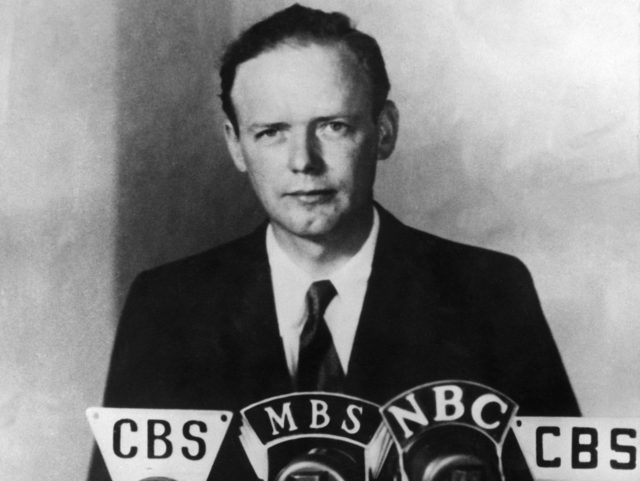Republican frontrunner Donald Trump devoted his major foreign policy address Wednesday to a theme, “America First,” that has been discredited through its association with Charles Lindbergh’s isolationist efforts to keep the U.S. out of the Second World War.
In his address Wednesday, Trump defined “America First” as follows: “My foreign policy will always put the interests of the American people, and American security, above all else.”
That would seem the obvious goal of any American foreign policy. Arguably, eight years of sabotage by the Obama administration, and decades of “post-American” policy at the State Department, have made a return to basics necessary.
But Trump’s most vociferous critics will see the phrase as a “dog whistle” to the far right.
In an infamous speech in Des Moines, Iowa on Sep. 11, 1941, Lindbergh blamed “foreign interests” and “a small minority of our own people” for attempting to drag the U.S. into the war. He did not mince words: “The three most important groups who have been pressing this country toward war are the British, the Jewish and the Roosevelt administration,” Lindbergh declared.
He had already been chastised by President Franklin Delano Roosevelt, and had resigned his military commission earlier that year (though he would later participate in the war in a civilian capacity).
“America First” soon became associated with isolationism, antisemitism — and short-sightedness: Just three months after Lindbergh’s speech, Japan attacked Pearl Harbor and Germany declared war on the U.S., making Lindbergh’s stance obsolete.
Trump certainly knows the legacy of “America First.” And just as he seems unafraid of politically correct taboos on other subjects, Trump seems prepared to risk the backlash “America First” will certainly bring.
In addition, Trump’s policy takes a different tack.
His is not an isolationist approach. In fact, it calls for engagement with Russia (however dubious a proposition this may seem after Hillary Clinton’s failed “reset”), and confronting China.
Trump does want to pull back from nation-building abroad. He also wants to spread the financial cost of global security to U.S. allies, and insists Muslim nations in the Middle East must reciprocate America’s good intentions.
That is not “isolationist” as much as it is an alternative to years of incoherence and appeasement.
Combined with Trump’s focus on ending illegal immigration and on re-negotiating free trade deals on more favorable terms, what “America first” means to Trump is a shift in American priorities without abandoning American leadership.
Curiously, Trump’s rival, Sen. Ted Cruz (R-TX), responded by attacking Trump for political corruption, not by attacking the substance of his address, or the problematic history of “America First.” Instead, Cruz said the following:
With this address [Trump] is now the foreign policy candidate of the Washington lobbyists, even as he proclaims “America first,” he puts K Street lobbyists first. He is never going to fight the system, he is the system. He and Hillary Clinton are two sides of the same coin. She has made her millions from inside and Donald Trump has made his billions buying people like Hillary Clinton. Both are part of the culture of foreign policy for personal gain.
Cruz supporters might regard that as a missed opportunity — and liberal critics will say, as they have said before, that he is afraid to confront Trump’s alleged far-right-wing base.
That criticism would be overblown. If there is any trace of Lindbergh’s ideas in Trump’s version of “America First,” it is in Trump’s attack on what he calls “the false song of globalism.”
Certainly global institutions such as the United Nations have become tools for anti-Americanism, antisemitism, and evil. And other, more positive institutions, like NATO, have struggled to respond to new threats and challenges.
But as Trump himself acknowledges, it is impossible to secure some U.S. interests without cooperation with other nations. That cooperation requires a global outlook.
“America First” may be due for a revival — as long as it is not “America alone.”
Joel B. Pollak is Senior Editor-at-Large at Breitbart News. His new e-book, Leadership Secrets of the Kings and Prophets: What the Bible’s Struggles Teach Us About Today, is on sale through Amazon Kindle Direct. Follow him on Twitter at @joelpollak.

COMMENTS
Please let us know if you're having issues with commenting.